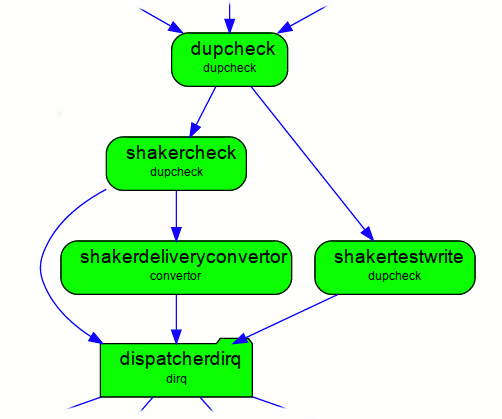Shaker*
From PlcWiki
(Created page with 'On some routes, selected cockpits enter the route twice. Each with a different sequence number, with the same product ID. A special dataflow is created to capture this somehow. E…')
Newer edit →
Revision as of 12:29, 13 October 2020
On some routes, selected cockpits enter the route twice. Each with a different sequence number, with the same product ID. A special dataflow is created to capture this somehow. E.g. GOL460.
Dupcheck determines the target service according to the given criteria. In GOL460, this is one of the items in the header. If it is a shaker cockpit, it sends the cockpit to a specially configured 'shakertestwrite' dupcheck.
This dupcheck has no "duplicates target" (DuplicatesDir = ""), only stores all through cockpits in the "check dir" and has the MaxAgeDays parameter set to keep cockpits old only for a given time interval. For naming, it uses only the cockpit ID to mark as a duplicate a cockpit with the same ID regardless of the sequence number. The target is 'dispatcherdirq' , which sends data to target services. To the kernel, etc.
During the second pass, the cockpit no longer bears the "SHAKER" flag, so it passes from the dupcheck to the "shakercheck" service.
This is again a specially configured ducheck. Shares check dir with 'shakertestwrite' dupcheck. It does not write to it (WriteToCheckDir = false). If the pass cockpit is found to be a duplicate, it is not stored in a duplicate directory, but forwarded to another service (DuplicateTargetService = shakerdeliveryconvertor).
The 'shakerdeliveryconvertor' converter sets the second pass flag on the cockpit and sends it to 'dispatcherdirq' .

